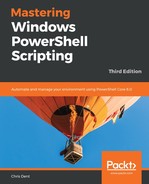In addition to the AST, PowerShell can also convert a script into a series of tokens, each representing an element of a script.
In PowerShell 2, the Tokenize static method of System.Management.Automation.PSParser may be used; an example is as follows:
$script = @'
# A short script
if ($true) {
Write-Host 'Hello world'
}
'@
$errors = @()
$tokens = [System.Management.Automation.PSParser]::Tokenize($script, [Ref]$errors)
The tokens array contains objects describing each part of the script. The first of these is shown as follows; it describes the comment at the start of the script:
Content : # A short script
Type : Comment
Start : 0
Length : 16
StartLine : 1
StartColumn : 1
EndLine : 1
EndColumn : 17
With PowerShell 3, two static methods on the System.Management.Automation.Language.Parser Parser type may be used: ParseInput and ParseFile. The two methods return an AST; tokens are returned via a reference to an array. An example is as follows:
$script = @'
# A short script
if ($true) {
Write-Host 'Hello world'
}
'@
$tokens = $errors = @()
$ast = [System.Management.Automation.Language.Parser]::ParseInput(
$script,
[Ref]$tokens,
[Ref]$errors
)
The token that's returned is structured differently from the token returned by the Tokenize method in PowerShell 2. The comment token is shown as follows:
Text : # A short script
TokenFlags : ParseModeInvariant
Kind : Comment
HasError : False
Extent : # A short script
Both AST nodes and the PowerShell 3 token objects are used by PSScriptAnalyzer.
